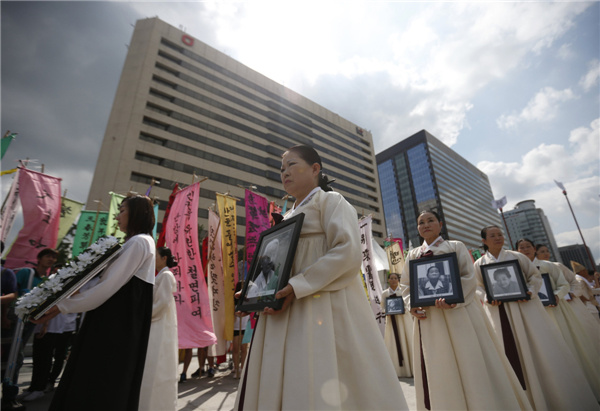

Participants carry portraits of Korean women who were forced into sexual slavery by the Japanese military during World War II during a requiem ceremony for former comfort woman Lee Yong-nyeo in central Seoul on Wednesday. Kim Hong-Ji / Reuters
Japanese Prime Minister Shinzo Abe has decided not to visit the war-linked controversial Yasukuni Shrine on Thursday, the 68th anniversary of Japan's surrender in the World War II, local media reported.
Instead, Abe may make a ritual offering to the shrine, and any offering would be only as president of the Liberal Democratic Party and not as prime minister, Japan's NHK Television reported.
Read more: China urges Japan to reflect on history of aggression
Powerful conservative groups expect the Japanese leader to visit the shrine on the anniversary. The shrine honors 14 class-A war criminals.
But Abe wants to avoid paying a heavy diplomatic price by angering Japan's neighbors who were victimized by his country in World War II, observers said.
"The prime minister made the decision not to visit the controversial shrine after considering Japan's own national interests in diplomacy with China and South Korea," said Zhang Boyu, deputy director of the department of Japanese political studies at the Chinese Academy of Social Sciences' Institute of Japanese Studies.
Beijing urges Tokyo to "honor its commitment" of admitting and reflecting on its history of aggression, Foreign Ministry spokesman Hong Lei told China Daily on Wednesday.
Japan should "restrain its remarks and behavior with precaution in relevant issues to win the trust of people from victimized Asian countries and the world", Hong said.
Japan's Kyodo News Agency defines the shrine as "a symbol of Japanese past militarism". Visits to the shrine by Japanese officials have sparked outcries, most notably in China and South Korea, both of which suffered under a brutal Japanese wartime occupation.
Yet conservative groups, including the Nippon Izokukai, have long encouraged government officials to visit the shrine.
Read more: Beijing-Tokyo dispute affects ASEAN
Japan's leading media have not attributed Wednesday's latest update of the prime minister's decision to any source, and neither the prime minister's office nor the party's headquarters would confirm the media reports, Reuters said.
Before Japan's lower house election in December, Abe expressed "great regret" about not visiting the shrine during his first term as prime minister in 2006-07. Japanese media labeled such remarks as efforts to win the hearts of radical voters.
Copyright ©1999-2018
Chinanews.com. All rights reserved.
Reproduction in whole or in part without permission is prohibited.